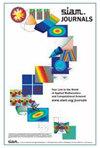Analysis of a Class of Multilevel Markov Chain Monte Carlo Algorithms Based on Independent Metropolis–Hastings
IF 2.1
3区 工程技术
Q2 MATHEMATICS, INTERDISCIPLINARY APPLICATIONS
引用次数: 2
Abstract
In this work, we present, analyze, and implement a class of multilevel Markov chain Monte Carlo (ML-MCMC) algorithms based on independent Metropolis–Hastings proposals for Bayesian inverse problems. In this context, the likelihood function involves solving a complex differential model, which is then approximated on a sequence of increasingly accurate discretizations. The key point of this algorithm is to construct highly coupled Markov chains together with the standard multilevel Monte Carlo argument to obtain a better cost-tolerance complexity than a single-level MCMC algorithm. Our method extends the ideas of Dodwell et al., [SIAM/ASA J. Uncertain. Quantif., 3 (2015), pp. 1075–1108] to a wider range of proposal distributions. We present a thorough convergence analysis of the ML-MCMC method proposed, and show, in particular, that (i) under some mild conditions on the (independent) proposals and the family of posteriors, there exists a unique invariant probability measure for the coupled chains generated by our method, and (ii) that such coupled chains are uniformly ergodic. We also generalize the cost-tolerance theorem of Dodwell et al. to our wider class of ML-MCMC algorithms. Finally, we propose a self-tuning continuation-type ML-MCMC algorithm. The presented method is tested on an array of academic examples, where some of our theoretical results are numerically verified. These numerical experiments evidence how our extended ML-MCMC method is robust when targeting some pathological posteriors, for which some of the previously proposed ML-MCMC algorithms fail.一类基于独立Metropolis-Hastings的多级马尔可夫链蒙特卡罗算法分析
在这项工作中,我们提出、分析并实现了一类基于独立Metropolis-Hastings建议的多级马尔可夫链蒙特卡罗(ML-MCMC)算法,用于贝叶斯反问题。在这种情况下,似然函数涉及求解一个复杂的微分模型,然后在一系列越来越精确的离散化上进行近似。该算法的关键在于利用标准的多层蒙特卡罗参数构造高度耦合的马尔可夫链,以获得比单层MCMC算法更好的代价容忍复杂度。我们的方法扩展了Dodwell等人的思想[SIAM/ASA J.]。Quantif。, 3 (2015), pp. 1075-1108]到更广泛的提案分布。我们对所提出的ML-MCMC方法进行了彻底的收敛性分析,并特别证明了(i)在(独立)提议和后验家族的一些温和条件下,我们的方法生成的耦合链存在唯一不变的概率测度,(ii)这种耦合链是一致遍历的。我们还将Dodwell等人的成本容忍定理推广到我们更广泛的ML-MCMC算法中。最后,我们提出了一种自调优连续型ML-MCMC算法。本文提出的方法在一系列学术实例上进行了测试,其中我们的一些理论结果得到了数值验证。这些数值实验证明了我们的扩展ML-MCMC方法在针对一些病理后验时是如何鲁棒的,而之前提出的一些ML-MCMC算法在这方面失败了。
本文章由计算机程序翻译,如有差异,请以英文原文为准。
求助全文
约1分钟内获得全文
求助全文
来源期刊

Siam-Asa Journal on Uncertainty Quantification
Mathematics-Statistics and Probability
CiteScore
3.70
自引率
0.00%
发文量
51
期刊介绍:
SIAM/ASA Journal on Uncertainty Quantification (JUQ) publishes research articles presenting significant mathematical, statistical, algorithmic, and application advances in uncertainty quantification, defined as the interface of complex modeling of processes and data, especially characterizations of the uncertainties inherent in the use of such models. The journal also focuses on related fields such as sensitivity analysis, model validation, model calibration, data assimilation, and code verification. The journal also solicits papers describing new ideas that could lead to significant progress in methodology for uncertainty quantification as well as review articles on particular aspects. The journal is dedicated to nurturing synergistic interactions between the mathematical, statistical, computational, and applications communities involved in uncertainty quantification and related areas. JUQ is jointly offered by SIAM and the American Statistical Association.
 求助内容:
求助内容: 应助结果提醒方式:
应助结果提醒方式:


